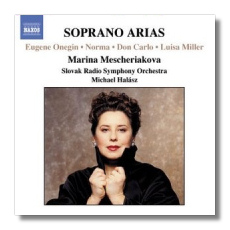
The Internet's Premier Classical Music Source
Related Links
- Latest Reviews
- More Reviews
-
By Composer
-
Collections
DVD & Blu-ray
Books
Concert Reviews
Articles/Interviews
Software
Audio
Search Amazon
Recommended Links
Site News
 CD Review
CD Review
Marina Mescheriakova

Soprano Arias
- Sergei Rachmaninoff: Francesca da Rimini
- Piotr Ilyitch Tchaikovsky: Eugene Onegin
- Giuseppe Verdi:
- Don Carlo
- Luisa Miller
- Simon Boccanegra
- Ernani
- Vincenzo Bellini: Norma
- Gaetano Donizetti: Maria Stuarda
- Gaspare Spontini: La Vestale
Marina Mescheriakova, soprano
Slovak Radio Symphony & Chorus/Michael Halász
Naxos 8.557109 DDD 56:16
This Russian-born soprano made her debut at the Bolshoi Theater, but now centers her career in Vienna. She also has performed at the Metropolitan Opera in New York City, and has made concert appearances at the Royal Opera, Covent Garden, and at the Châtelet Theater in Paris. Mescheriakova is no stranger to recordings – for example, she sang in Jérusalem (the French version of I Lombardi) for the Philips label.
This recording, made in Bratislava in September 2002, is a mixed bag. Things get off to a strong start with a brief aria from Rachmaninoff's retelling of the love story of Francesca da Rimini and her brother-in-law Paolo Malatesta. Mescheriakova floats impressive high notes here, and her sound is clear yet womanly (as opposed to girlish). She seems to be at her best when the music's emotional content is conciliatory, because she makes a similarly positive impression with "O nume tutelar" from Spontini's La Vestale – a specialty of Maria Callas, by the way.
The weaknesses of this recital are most evident in the three selections that are more than ten minutes long: Tatiana's Letter Scene from Eugene Onegin, "Tu che le vanità" from Don Carlos, and "Casta diva" from Norma. Each of these selections – the first two, particularly – demand shadings and nuances that just are not apparent here. The booklet note is quick to explain that the Soviet Union never developed a performance tradition for "foreign" operas, except for the most popular ones (Carmen, Madama Butterfly, etc.), and congratulates the singer for being "brave" enough to tackle repertoire she cannot have had much experience with until fairly recently. And indeed, Elisabetta's plight in Don Carlos is painted with a broad brush. Furthermore, the coloratura in the "Ah! bello a me ritorna" cabaletta from Norma is ungainly. (The same holds true for "Tutto sprezzo, che d'Ernani" from Ernani.) A Russian singer can hardly have an excuse for lacking familiarity with Tchaikovsky's Tatiana, however! And, to add to the problems, Mescheriakova's high notes, when they are pushed, wobble and spread unattractively. Live, she might be exciting, but this singing probably won't hold up for listening at home.
If Mescheriakova is too placid on much of this CD, the blame can be placed, at least in part, on the lap of Michael Halász, who conducts as if he is afraid that someone will hear him and his orchestra. This is some of the limpest conducting I've ever heard on a recital CD in a while. Halász has done good work elsewhere (Naxos' Don Giovanni, for example), so I hope that his conducting here is just an aberration.
Unusually, texts and translations have been included – generous for a program of this sort. Still, for those who are interested in this repertoire, any number of dramatic sopranos (Callas, Leontyne Price, Renata Scotto, etc.) can be recommended over Mescheriakova.
Copyright © 2004, Raymond Tuttle



















